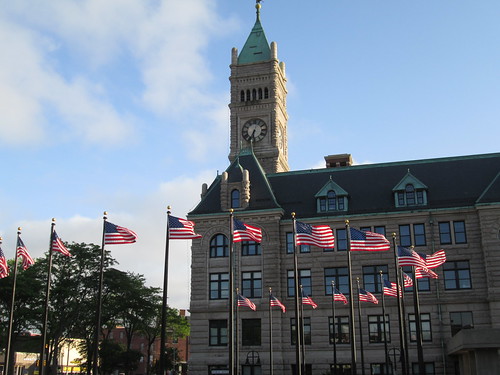Lowell Charter Change Meeting Tonight

Tonight at 6 pm at the Lowell Senior Center, 276 Broadway, the city council’s Ad Hoc Charter Review Committee will meet to discuss possible changes to the organization of Lowell’s government and to how we elect our city councilors.
The choice of meeting site and past practice of this committee suggest that public input will be welcome, so please make an effort to make it to this important meeting. I understand that the meeting will be video recorded for subsequent replay on LTC, but that it won’t be shown live.
In preparation for tonight’s meeting, it might be helpful to review how the city’s charter has changed through the years:.
Lowell was organized as a town in 1826 but the official City Charter was granted on April 11, 1836 (which makes next year the city’s 175th anniversary but that’s another story). Skipping the early years of alderman and mayors elected to one-year terms, the first modern governmental charter was enacted in 1921. It provided for an elected mayor and a council of 15 members with 9 elected by ward and 6 elected at large. The school committee consisted of 9 members elected at large.
The city adopted Plan E in 1944 which consisted of a city manager, 9 city councilors elected at large, and 6 school committee members elected at large – essentially the system we have today EXCEPT the council election used proportional representation, the voting method that requires voters to rate their candidates 1 through 9. A complex formula that tabulates all the #1 votes, then all the #2 votes, and so on, is used to decide the victors. (This is the system that the 2009 referendum sought to enact).
A major change occurred in 1957 when the city discontinued proportional voting in favor of “plurality voting” which is the system we have now – one vote counts for one vote with no weighting involved.
In the late 1960s, a charter commission was elected. That group proposed a change to a “strong mayor” form of government but the voters rejected that in the 1971 election by a 2 to 1 margin. The defeat of the charter change by such an overwhelming margin seemed to suppress the reform impulse for a couple of decades.
In 1993, there were four non-binding questions on the ballot:
- Question 1 – Do you support keeping the present Plan E form of government? Yes-8,234. No-8,779.
• Question 2 – Do you support a change in the city charter to provide for an elected mayor as chief executive instead of an appointed city manager? Yes-10,0441. No-6,760.
• Question 3 – Do you support a charter change that would provide for district councilors instead of elections at large? Yes-6,841. No-9,213.
• Question 4 – Do you support a limit on terms of all elected officials in the city of Lowell to a maximum of 4 two-year terms in office? Yes-11,946. No-5,093.
Nothing ever came of any of these questions, probably because that year also saw the election of six new city councilors, a transition that completely changed the city’s direction. Presumably, the almost entirely new council and the new direction satisfied the voters’ desire for change.
In the 2009 city election, there was a question that asked voters to endorse a weighted vote system called “choice voting.” By this method, voters would still select up to nine councilors, but they would rank them one through nine. One of the motives behind the initiative was to increase the chances that a candidate with a small core of highly committed voters would be elected as opposed to another candidate who had broad-based but only moderately committed supporters. That referendum was defeated 57% to 43%.
Hi Dick – I just wanted to correct something in your post regarding the ballot questions in 1993. It is not true that nothing came of them. After question 4 passed, I made good on my campaign promise and convinced the council to place the question of term limits on the ballot in binding form in the next election. That question also passed convincingly and the City’s charter was changed to include limits of 4 terms on all elected officials.
Several years later, after I had left the council and the term limits fever had broken in the community, the council put a binding question on the ballot to repeal term limits. This time the people narrowly voted in favor of repealing term limits. So while term limits was the law of the land for a short time, the successful charter change was repealed before anybody was impacted.
Steve Gendron
Former City Councilor (and still a term limits advocate)